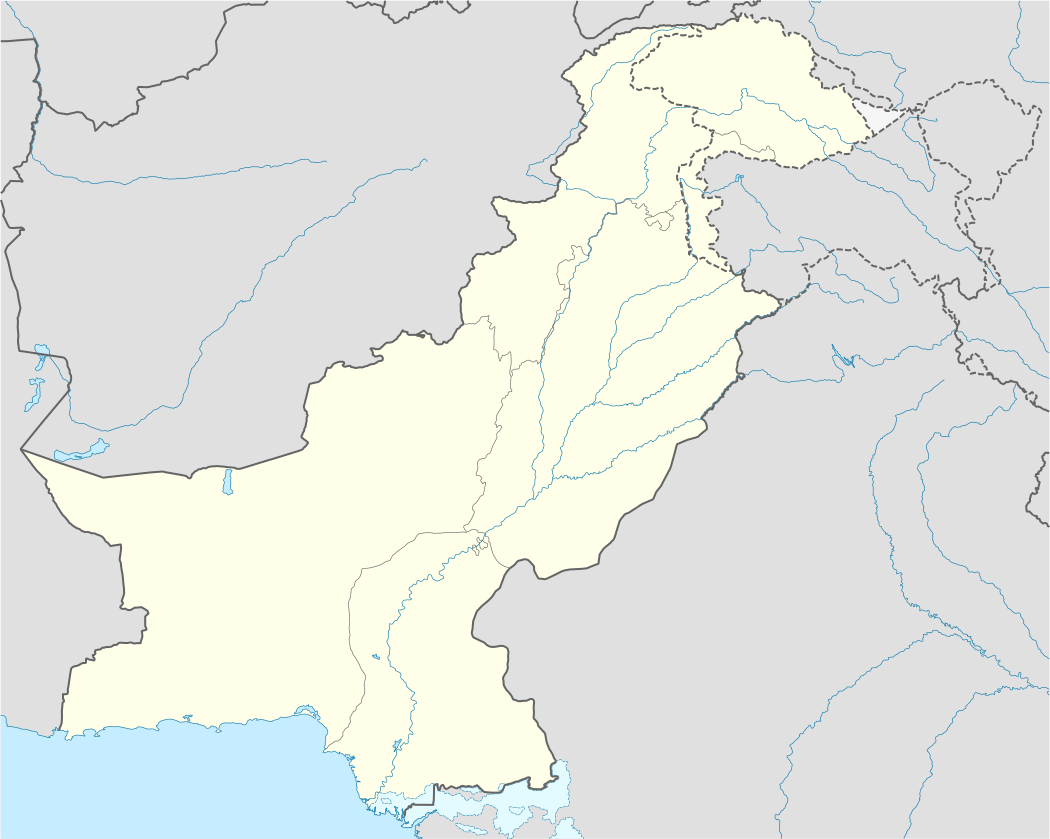Hadali
Hadali (Urdu: هڈالى) is a town located in Khushab District in the Punjab Province of Pakistan. The town is administratively subdivided into two Union Councils, including Hadali-Ii.[2][3]
Hadali | |
|---|---|
 Location in Pakistan | |
| Coordinates: 32°17′32″N 72°11′32″E | |
| Country | Pakistan |
| Province | Punjab |
| Elevation | 188 m (617 ft) |
| Population (2010) | 57,351[1] |
History
Khushab District was a forested agricultural region during the Indus Valley Civilization. The Vedic period was characterized by Indo-Aryan culture that invaded from Central Asia and settled in the Punjab region. The Kambojas, Daradas, Kaikayas, Madras, Pauravas, Yaudheyas, Malavas, and Kurus invaded, settled and ruled the ancient Punjab region.
After overrunning the Achaemenid Empire in 331 BCE, Alexander the Great marched into the Punjab region with an army of 50,000. The Khushab region was ruled by Maurya Empire, Indo-Greek kingdom, Kushan Empire, Gupta Empire, White Huns, Kushano-Hephthalites and Shahi kingdoms.
In 997 CE, Sultan Mahmud Ghaznavi, took over the Ghaznavid dynasty empire established by his father, Sultan Sebuktegin. In 1005, he conquered the Shahis in Kabul in 1005, and followed it by the conquests of the Punjab region. The Delhi Sultanate and, later, the Mughal Empire ruled the region. The Punjab region became predominantly Muslim due to missionary Sufi saints whose dargahs dot the landscape.
After the decline of the Mughal Empire, the Sikh Empire invaded and occupied the Khushab District. During the period of British rule, Khushab district increased in population and importance.
The predominantly Muslim population of Khushab District supported the Muslim League and Pakistan movement. After independence in 1947, the minority Hindus and Sikhs migrated to India while the Muslim refugees, Rajputs, from India settled in the Hadali after Partition of India and Pakistan in 1947. Muslim Rajputs who migrated to India settled in the Hadali.
Economy
hadali economy based on agriculture and farming there main Crops[4] were
- sugarcane
- gram
- wheat
- rice
cattle farming is also play measure role of growing there economy
Public Figures
- Malik Khuda Baksh Wadhal Tiwana
- Malik Muhammad Azam Tiwana Shaheed
- Muhammad Akhtar Islam Bali Advocate(Ex-Nazim Hadali)
- Malik Hamid Mehmood Tiwana
- Malik Ahmad Yar Tiwana
- Col (R) Muhammad Ali Bali
- Haji Mehar Ali Bali(Late)
- Capt (late) Malik Khuda Bakhsh Tiwana
- Capt (late) Malik Muhammad Azam Tiwana (Mastial, Numbardar)
- Major (late) Malik Allah Bakhsh Tiwana (Mastial)
- Numbardar (late) Malik Muhammad Khan Mastial Tiwana
- Malik Abdul Majeed Mastial Tiwana (late) Justice retired High Court.
- Major Ahmad Khan Wadhal Tiwana Shaheed kargil.
- Rana Nazar Muhammad (Baba Nazra)
- Rajput (Late).
- Malik Muhammad Charagh Bali (Late)
- Malik Muhammad Naeem Ullah Wadal (Late).
- Malik Mazhar Wadal (Late)
- Malik Aziz Ullah Mastiyal Tiwana (Late).
- Malik Sakir Ali Wadal Tiwana (Late).
- Malik Muhammad Qasim Wadal (Late).
- Maj Malik Asif Ali Bali.
- Lt Col (R) Abdul Khaliq.
- Lt Col (R) Abdul Malik.
- Col Malik Rooh ullah Bali.
- Brigadier Malik Rasheed Ali Bali.
- Brigadier Malik Hafeez Ali Bali.
- Brigadier Muhammad Ahsan Tiwana.
- Brigadier Muhammad Nazar Tiwana.
- Brigadier Muhammad Azam Tiwana.
- Maj Ali Abdullah Tiwana (27 Cavalry).
- Malik Muhammad Ijaz Awan (Miyana)
- Malik Ahmad Hassan Tiwana (Late)
- Malik Habib Nawaz Tiwana
Notables
- Khushwant Singh was an Indian Sikh journalist and novelist born in 1915. Some of his ashes were scattered in Hadali.[5]
- Amrita Singh, Indian actress
References
- Word Gazetteer.
- Local Government Elections - Government of Pakistan Archived 2008-01-24 at the Wayback Machine
- Location of Hadali - Falling Rain Genomics
- "Natural Resources | Punjab Portal". www.punjab.gov.pk. Retrieved 2020-03-03.
- Fistful of Khushwant’s ashes saved for Pakistan
External links
- Hadali on Facebook
- "Natural Resources | Punjab Portal". www.punjab.gov.pk. Retrieved 2020-03-03.